I hate to say I told you so, but this is how I summarised the Western Force’s Super Rugby 2021 prospects last December:
“The Force should certainly be strong enough to win at least 50 per cent of their games in 2021, and that may be enough to slingshot them into local play-off contention.”
That comment formed part of an article which suggested the addition of ex-Reds second row Izack Rodda as part of the Force’s ongoing trawl for new talent.
“From this point of view, the best Christmas gift [Tim] Sampson could receive would be the news that Izack Rodda wants to return to Australia – more precisely, to Western Australia.”
Rodda duly signed with the Force in March.
There is no doubt whatsoever that the quality of the recruitment drive in Western Australia has surpassed all of its peers in the country, despite the loss of ace Argentine hooker Julián Montoya to the Leicester Tigers on the eve of the tournament.
The Force badly needed to find some speed and finishing ability in the back three, and they got it in a part-exchange loan signing from Tigers, ex-England age group wing Jordan Olowofela. The Welford Road academy graduate bagged a hat-trick of tries in the weekend nail-biter against the Queensland Reds.
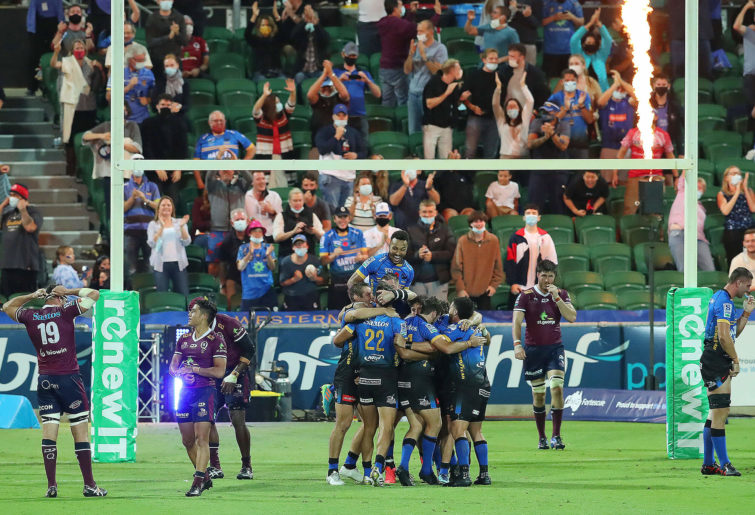
Jordan Olawofela was pivotal in the Force’s win over the Reds. (Photo by Will Russell/Getty Images)
Tim Sampson and his coaches unearthed Feleti Kaitu’u to replace Montoya, and he was selected in Dave Rennie’s first Wallaby squad of 2021. They found Tim Anstee in Australian sevens and he made it to Rennie’s camp, too.
All of the signings for the 2021 season (bar Tomás Lezana) – Tom Robertson, Santiago Medrano, Sitaleki Timani and Anstee up front; Tomas Cubelli, Domingo Miotti, Tevita Kuridrani, Rob Kearney, Toni Pulu and Olowofela behind – have been fully integrated as starters as the team have continued the steady upward curve of their development.
If the Force beat the Reds anywhere (other than the scoreboard) on the field on Friday evening, it was in the maturity of their leadership. James O’Connor has been touted as a Wallaby captain in 2021, but the relationship between O’Connor and club captain Liam Wright did not work out particularly well on the night.
The Reds started by taking two close-range attacking scrums against the Force when they were down to 14 men, and they scored tries from both. So far, so good.
The clarity of the decision making started to unravel in the second period, with Queensland opting for scrums in the 65th and 79th minutes against a full, 15-man defence. The last failed attacking scrum decided the fate of the game in the Force’s favour.
When the hosts awoke to the fact that they could win the match in the third quarter, there were plenty of veteran Yodas willing and able to steer the ship home. Jeremy Thrush and Tevia Kuridrani may be far more limited in the range of their movements than they were at their athletic peak, but both still know how to influence the course of important games at critical moments.
Kuridrani – now ruled out of the preliminary final against the Brumbies – dredged his muscle memory to relive the day when he was the most powerful, dominant back on the paddock. It all started with a huge hit on his opposite number Hunter Paisami, which immediately ended the Queensland man’s interest in proceedings:
Tevita spots his opposite number coming hard onto the angled ball off Tate McDermott, and the first lesson is crystal clear: never give Tevita Kuridrani a definite target!
Kuridrani’s influence was also felt via his communications skills – first, on defence:
He throws up an arm to keep Olowofela away from the ball which Domingo Miotti has hacked ahead – pick it up, and he will be pinged for offside:
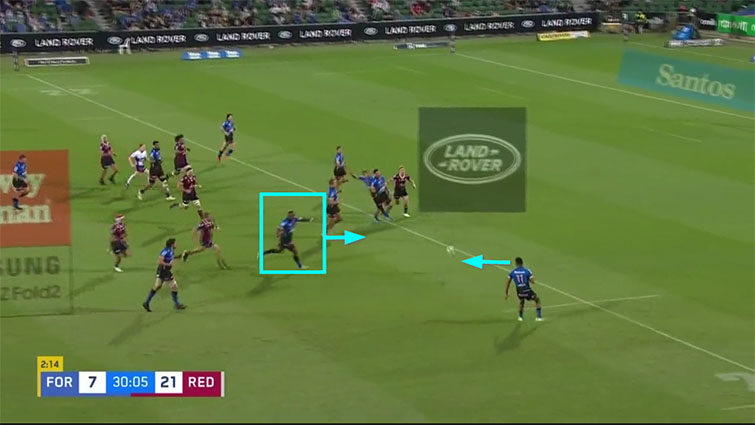
With the English wing backing off, Kuridrani is able to make another offensive tackle on Bryce Hegarty and set up a successful jackal by Miotti behind him. The penalty goes the other way.
The big man’s communication on attack was just as good.
Take a look at the three-minute mark on the above highlights reel. As the ball is spun out to the left, Kuridrani knows he is marked by Hegarty and signals for the ball to go over the top to Olowofela directly:
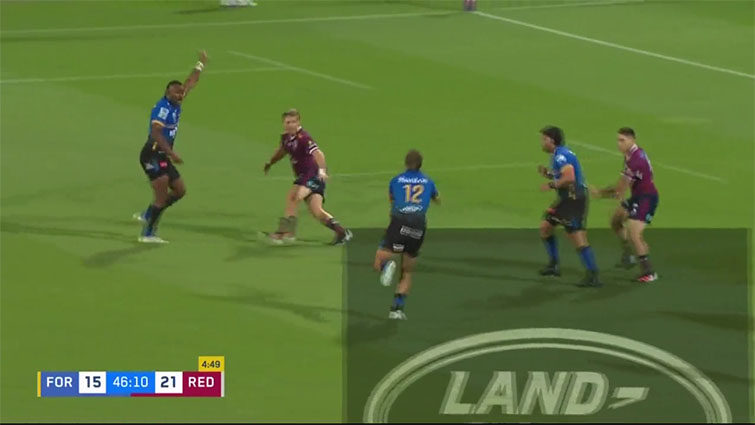
Kyle Godwin duly obliges, and Olowolofela is able to score his second try of the game.
When Kuridrani finally departed in the 74th minute, it was a case of replacing one 30-year-old with a 35-year-old guru in the shape of Richard Kahui. Kahui still had the time to make two decisive interventions, the first of which was putting through a perfectly weighted left-foot kick for Olowofela to score the final try (which can be seen at five minutes on the highlights reel).
In the final act, Kahui held up Josh Flook over the goal-line to force a maul turnover:
The two men assisting him are Godwin and Jeremy Thrush. The Force second row was also highly instrumental in spotlighting some Reds’ weaknesses which had previously been masked by their wins.
At 36 years of age, Thrush is the most venerable of all the Yodas at the Force, and has accumulated a lifetime of lineout wisdom. The Reds struggled on their own throw, losing four lineouts out of 13 to first touch, with three of those converted to full turnovers.
With Angus Scott-Young in his debut season as a lineout caller, the Queensland set-piece is quite straightforward. The majority of throws are pre-called before the forwards enter. Thrush knew exactly where to position himself to mount a contest:
He knows the ball is going to Lukhan Salakaia-Loto in the middle, and the Force forwards close the gap on the Reds big man before the throw is ever made – less than half a metre separates the two lines as Brandon Paenga-Amosa delivers the ball, and that gives Thrush a realistic shot in defence:
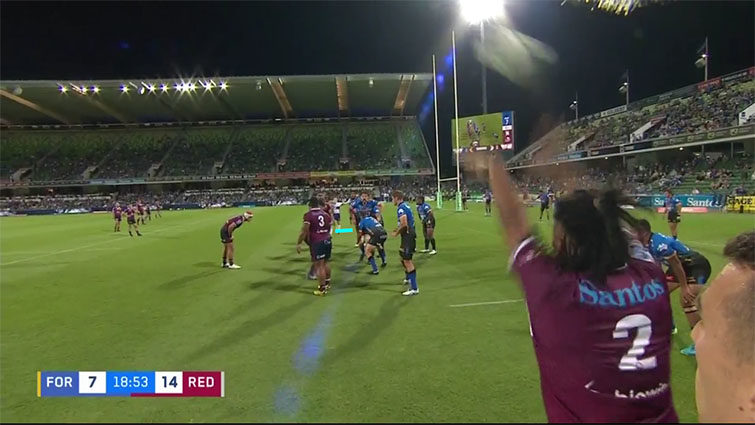
The signs that Thrush had read and understood the Queensland lineout before a ball was ever thrown were plain at one second-half set-piece:
Thrush is so certain of the target area that he is able to make the steal look for all the world like a blue throw, not a maroon one.
He was just as effective when he chose to compete on the ground.
Thrush is able to swim past the receiver, Liam Wright, and onto Alex Mafi, who is the ball-carrier at the back. That is the lineout drive stuffed.
The other area of weakness highlighted by Thrush’s activity was the vulnerability of scrumhalf Tate McDermott at the base. In a recent Coach’s Corner column, I outlined how McDermott’s tendency to stand tall and lift the ball off the ground before passing could create a problem for the attack.
The Force obviously had a plan to pressure McDermott from his kicking (right) side, and it was put into action from the start:
Thrush is positioned to block the box-kick and he nearly gets into Bryce Hegarty’s exit, just for good measure. It was a repeated issue, and not only in obvious kicking situations:
The final counter-ruck by Thrush is especially instructive. The Force have McDermott just where they want him – standing tall in the saddle and out of sync with the support outside him – and it takes an outstanding, high-risk offload by Taniela Tupou to rescue the play:
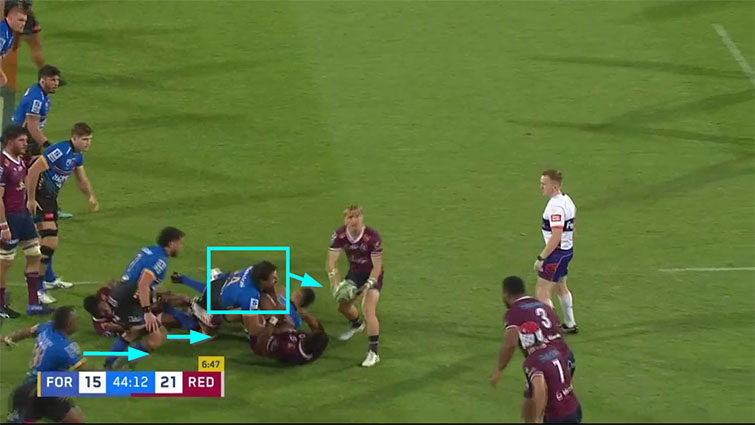
Summary
Both Tevita Kuridrani and Jeremy Thrush may have spent ten minutes in the sin bin after receiving yellow cards, but their positive contributions still comfortably outweighed the negatives against the Reds. It was a game where the leadership of the old souls in the Force made most of the difference.
In the process, some of the Queensland fault lines, previously masked by their long winning run, have become more evident. There is a question about who is really captaining the side after Liam Wright’s long-awaited return from injury. The choice to take scrums from close range in the second half, against 15 men, ultimately cost them the match.
The Reds have also backed themselves into a corner by delegating the lineout calling to Angus Scott-Young. Scott-Young has made a decent fist of the job, with an 86 per cent success record across the regular season. At this stage of proceedings, it is too late to change to someone else.
But it also means he has to start the game ahead of players who could add more potential value to the Reds’ cause in the grand final – Wright in the back row, or Seru Uru (the Reds’ best lineout player) in the second row.
Whoever reaches that final, whether it is the Force or the Brumbies, will have noticed the fragility of the Reds’ lineout under pressure. Queensland were confined to winning ball from the front or middle of the line, and that is not ideal.
They will also have observed Tate McDermott’s vulnerability at the base when kicking or passing. The last game of the season is very far from a foregone conclusion, regardless of the contestants.
In the meantime, the advances the Force have made from a near-death experience have to be admired. They have not only re-awakened, they have come back from the dead, and are one tantalising step away from a domestic final.
They can no longer be counted as the fifth team in Australia – even if the idea of maintaining five genuinely competitive professional franchises still seems as improbable as ever.
Original source: https://www.theroar.com.au/2021/04/28/wise-old-heads-prevail-as-the-force-awakens/
source https://therugbystore.com.au/wise-old-heads-prevail-as-the-force-awakens/
No comments:
Post a Comment